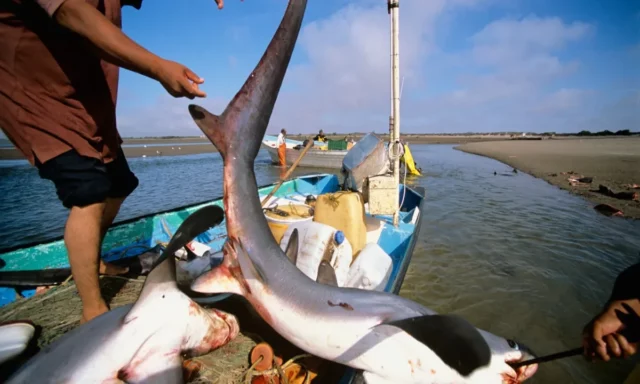In the past five decades, global oceanic shark and manta ray populations have declined by 71%, fueled by overfishing and the unregulated trade in shark fins, meat, liver oil (squalene), and cartilage.
High-value growing market
The trade in high-value shark fins and the growing market for other shark products are fueling illegal fishing and some of the most egregious human and labor rights abuses found aboard these vessels, conservationists say. Hence, these organizations applaud the proposal of the Convention on International Trade in Endangered Species of Wild Fauna and Flora, CITES, to include requiem sharks, a family of sharks with species such as the silky shark and the oceanic whitetip shark, to protect them and thus end the global fin trade. Requiem sharks make up the majority of the shark fin and meat trade, being one of the least regulated families.
The proposal will be known at the 19th meeting of the Conference of the Parties (CoP 19) in Panama, next month and CITES member countries have been asked to accept this proposal and not miss the opportunity to increase the protection of these species while helping to regulate the fin trade.
The Coalition of Conservation organization, For the Oceans Foundation, Fins Attached Marine Research and Conservation, Rob Stewart Sharkwater Foundation and United Conservationists, say that healthy oceans are one of the best tools to deal with climate change, since they provide most of the oxygen of the planet and the food security of billions of people.
That is why they ask all people to add their voice to this petition, by entering the following link: https://only.one/act/cites “CITES is a great stage to showcase what is happening to global shark populations.”

Governments must act quickly before it is too late for the survival of these species
The data is indisputable, but it is meaningless if nothing is done to enact stronger protection laws. Also, when it comes to shark biology, taking a precautionary approach, since they simply cannot reproduce fast enough to keep up with commercial fishing, said Alex Antoniou, CEO of Fins Attached: Marine Research and Conservation.
“As with all efforts to protect ocean wildlife, we are concerned about whether CITES recommendations are sufficient to address illegal, unreported and unregulated (IUU) fishing”, added Antoniou.
“We applaud the incorporation of the requiem shark proposal to include a list of the entire family in Appendix II, proposed by Panama. We must support this work and continue to add other shark species to the CITES list. It will be a challenge to implement it effectively when illegal fishing continues to be fueled by global market demand,” said Jorge Serendero, CEO of the For the Oceans Foundation

